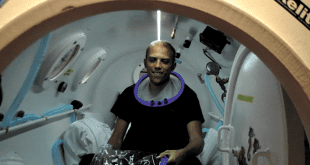Dr. London Butterfield became increasingly interested in the world of neuropsychology and brain health after reading, The Man Who Mistook His Wife for a Hat and Other Clinical Tales, written by a neurologist. There are many areas and aspects of cognitive functioning that can become impaired, as we age, or with traumatic brain injury or health conditions such as stroke, but we’re all too familiar with the growing epidemic of dementia.
According to the CDC, 6.2 million Americans have dementia, and that number is expected to triple by 2050. What can we do to prevent and treat this harrowing disease that robs individuals, their families and loved ones of their memories, personality, and familiar way of life?
What is Dementia?
Dementia is the umbrella term that describes the presence of cognitive deficits that interfere with daily functioning in conditions like Alzheimer’s disease, Lewy Body, Frontotemporal, and Vascular dementia. Some of these can be genetically influenced or caused by environmental and lifestyle choices.
Dr. Butterfield specializes in the brain-behavior relationship in adults and geriatric memory and movement disorders. We caught up with her to find out more about preventing dementia and other cognitive disorders, and treatment protocols.
H&W: How do you advise people to maintain cognitive and brain health in aging?
Dr. Butterfield: We recommend to, firstly, prioritize cardiovascular health through aerobic exercise, which helps increase the release of a growth factor, called BDNF (brain-derived neurotrophic factor) that can repair brain cells and prevent them from dying. Secondly, eating a healthy diet that is anti-inflammatory and includes antioxidants, fatty fish, leafy greens, and bright berries is essential. It’s important not smoke or consume too much alcohol. Thirdly, understanding your quality of sleep is critical. If you have sleep apnea, it needs to be treated as the lack of oxygen during sleep can cause cognitive and other health issues. Taking care of your heart and vessels will help protect your brain. Other critical factors are to socialize often, minimize stress, and challenge the mind by learning new things daily.
H&W: What are some of the signs of dementia?
Dr. Butterfield: Dementia is an umbrella term that describes the presence of cognitive deficit (compared to others the same age and reflecting a personal decline) that interferes with independence in everyday activities (e.g., paying bills, driving, or taking medication properly). This eventually occurs in neurodegenerative diseases, like Alzheimer’s disease, Lewy Body, and Frontotemporal dementia, as they advance. Early signs may include increased forgetfulness, repeating oneself, making errors in bill paying or in appointment scheduling, getting lost or turned around while driving, or changes in speech, judgement, or personality.
H&W: What is mild neurocognitive disorder or mild cognitive impairment?
Dr. Butterfield: This term is used to describe the state between normal age-related cognition and dementia that precedes dementia in those with a neurodegenerative disease, like Alzheimer’s. It describes a patient who has a deficit in one or more cognitive domains compared to others of the same age but is still independent in daily tasks. This is best diagnosed with a neuropsychological evaluation, which includes several cognitive tests to see whether there are deficits or whether this is normal age-related decline, what might be causing deficits, and whether this might be reversible. Your doctor can do a brief screening with you to see if you need more detailed evaluation. Sometimes the memory problem is not due to anything alarming but, rather, by a simple vitamin deficiency or infection that can be fixed. The earlier you start intervention with diet, exercise, stress reduction and sleep hygiene, the better.
H&W: What cognitive issues or signs are a part of normal aging?
Dr. Butterfield: If a person misplaces their keys or wallet sometimes, has occasional memory retrieval trouble, struggles to find a word in conversation, feels slower in processing or reaction time, or has more trouble than before with multitasking, these are often signs of “normal” aging. If these issues progress or if one’s family or friends express concern, then medical intervention and diagnosis is highly recommended.
H&W: What are some concerning signs worth investigating?
Dr. Butterfield: If someone is repeating themselves several times even within minutes without realizing it, is unable to remember recent events or conversations even after someone tries to jog their memory, struggles with learning new things (memory storage), has difficulty expressing thoughts or stumbles for words, sees things that aren’t there, and/or experiences personality changes, these can be significant warning indicators. Alzheimer’s typically happens later in life but can occur early, and Frontotemporal dementia typically starts with personality changes or changes in speech. If a person is experiencing any changes in their cognitive functioning, they should seek evaluation for a proper diagnosis.
H&W: Are the pharmaceutical companies producing anything that works for dementia?
Dr. Butterfield: There are drugs available that can improve functioning in the face of disease. So far, the studies haven’t been too successful in new drugs to prevent disease, but there’s a lot of ongoing work and we are getting closer to finding something to slow the progression of diseases that cause dementia. Certainly, there are several lifestyle changes we all can make to protect our brains from dementia.
If a family member is concerned, but the loved one isn’t, it’s still critical to pursue a neuropsychological evaluation.
Patients can get a free screening at the Memory Disorders Center, which is at St. Anthony’s Hospital and next to the Neuropsychology Dept.
If you or someone you know is experiencing cognitive issues, please reach out to seek interventional help and a proper diagnosis.
London C. Butterfield, PhD
Dr. London Butterfield is a licensed psychologist who specializes in clinical neuropsychology. She received her Ph.D. in clinical psychology from the University of South Florida in Tampa, Florida.
She received specialized training in neurodegenerative disease, specifically movement (e.g., Parkinson’s disease, Huntington’s disease, Lewy body dementia, Corticobasal degeneration, progressive supranuclear palsy) and memory disorders (Alzheimer’s disease, vascular dementia, frontotemporal dementia, mild cognitive impairment), and in epilepsy, brain injury, stroke, cancer, and learning disorders. She completed a clinical neuropsychology internship at the University of Florida in Gainesville, Florida, where she received training with adults and children, including pre- and post-surgery deep brain stimulation (DBS) and heart transplant/left ventricular assist device (LVAD) evaluations. Dr. Butterfield furthered her education by completing a fellowship at the University of Florida, where she focused on memory disorder assessments, evaluations and intervention program development for healthy older adults to improve thinking abilities and healthy lifestyle.
Dr. Butterfield has years of experience providing psychotherapy for a range of psychological difficulties, including depression, bipolar, anxiety, post-traumatic stress disorder (PTSD) and difficulties with adjustment. She has specialized experience in providing genetic counseling to those at genetic risk for Huntington’s disease and in working with refugees who have fled their country due to political or religious persecution and trauma. Dr. Butterfield has published articles in various peer-reviewed publications such as, the Journal of Neuropsychiatry and Clinical Neurosciences and Neuropsychology. Her clinical interests include adult and geriatric clinical neuropsychological assessment, movement disorders, memory disorders, brain injury and cognitive rehabilitation. She is a member of the International Neuropsychological Society and the American Psychological Association.
BayCare Medical Group Neuropsychology
1201 5th Ave. N., Suite 309
St. Petersburg, FL 33705
To make an appointment, please call
(727) 824-3189
 Central Florida Health and Wellness Magazine Health and Wellness Articles of the Villages
Central Florida Health and Wellness Magazine Health and Wellness Articles of the Villages

